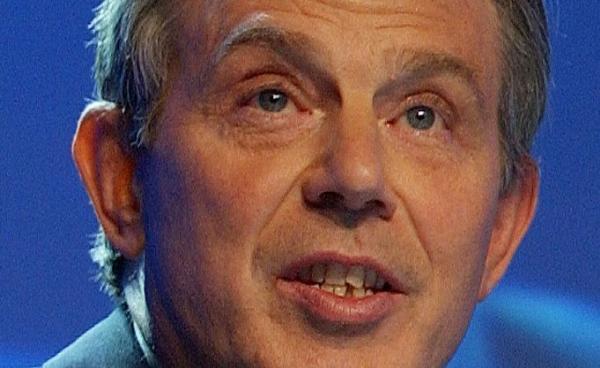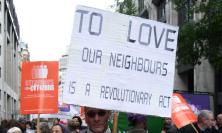Former British Prime Minister, Tony Blair, opened a series of lectures at Westminster Cathedral last Thursday with a major speech on the role of faith in the modern world. Angela Kitching assesses what we are to make of the grand vision set out here by a politician who until now was famously reluctant to speak openly about his faith.
In 2006, as part of his long goodbye tour before leaving Number 10, Tony Blair gave a speech to the Royal Society in which he said that any young person wanting to change the world should not become a politician, they should instead become a scientist. As the speech was delivered to the Royal Society, one could write off these words as a calculated attempt to flatter his audience but Tony Blair went further, he said that politics was ‘insufficient’ to face the future challenges facing the world; science held the answers.
Now, it would seem, since his much publicised profession of Catholicism in December 2007, Tony Blair has found a new source of hope for the future: He believes that faith holds the answers to the challenges of globalisation. Blair used his platform at ‘The Cardinal’s Lectures’ on Thursday 3rd April to talk about ‘Faith and Globalisation’ in a talk which seemed at times more of a manifesto than a reflection. This was a public declaration of policy and aims for religious belief and what he believed it could achieve in an increasingly globalised world.
Tony Blair started by clearly laying out his terms: the world is opening up; faith is a common and powerful thread across national boundaries; people acting in the name of faith can achieve good outcomes or bad; and interfaith action and encounter are vital to achieve peaceful, international co-existence. This simple summary seemed unchallenging, we’ve heard very similar words about the possibilities offered by faith communities from politicians of all parties for some time. The prominence of interfaith dialogue as the catch-all solution to faith-based conflict is frustratingly familiar. I don’t mean to suggest that interfaith dialogue doesn’t have this potential, just that recently, the government seems to focus on interfaith-only projects. So, it is often difficult to find support for projects specifically serving one religious community which might also help to build confidence and combat extremist beliefs and stereotypes in marginalized faith communities. Blair’s introduction did little to challenge our ideas of what politicians say about religion, but almost immediately after his introduction, in his own words he, ‘goes further’.
Tony Blair steps beyond the religious territory usually occupied by politicians arguing that ‘faith is a good thing in itself’. This is the start of his manifesto speech for a world where he sees ‘Faith and Reason, Faith and Progress, as in alliance, not contention’. This is a radical statement from a man whose press secretary famously said, ‘We don’t do God’ and Tony Blair knows it. He talks about why faith and politics are seen as a bad mix in Britain. Politicians who do ‘do God’ in public are, he says, seen as ‘weird’, ‘free from reason’ and ‘pretending to be better than the next person’. He is bold in his language, freed from political office he seems better able to articulate his own beliefs and challenge widely-held views on politicians who express their faith. It is clear that when he held political office he felt very restricted by the ‘packet of trouble’ that the media rained upon him when he talked about God.
Blair goes on to analyse the public face of religion in a largely secular, western world highlighting its good (community projects) and bad (violent extremism) aspects. He concludes that religion is concerned with the search for truth and, with some of the bossiness that was characteristic of his speeches when Prime Minister, he says that everyone – people of religious faith and no faith – should ‘accept the premise that faith is not in decline…It is still here with us, not just surviving but thriving’. So we have the core of his manifesto for religion in the modern age: Faith is a good thing in itself and has relevance for everyone. This is a man setting out his stall, staking his claim as public relations tsar for faith communities. We’re then told where he’s going to take us.
Faith, it would seem, is the best hope we have for adapting to globalisation. Blair’s is a fairly instrumental view of faith: what tools does it give us to speak to others? What values can we show are shared across nations? Faith is portrayed as a moral Condé Nast: Faiths are ‘global’, allowing us to empathise with other cultures, helping to deliver interfaith ‘encounters’ that ‘enact a world of co-existence’. Interfaith dialogue is projected in lush language of multiculturalism that downplays some of the hard discussions that must precede meaningful interfaith dialogue. To be fair, Tony Blair does allow for the fact that in presenting themselves, religions should be ‘proud of their own distinctive…identity’ but it seems that the topics on the table for a Blair-style interfaith encounter will be shared values, rituals and traditions – we may be playing spiritual snap. The manifesto vision Blair sets out aims to take us into a discussion of values which are shared by different faith communities in order to respond to the challenge of globalisation.
The practical reason for Tony Blair’s emphasis on developing a language of shared values is that the ‘centre of gravity, economically and politically, is shifting East’. He suggests that as China, India, Indonesia (with a growth rate of 6% per annum) and Vietnam gain power, the world will become ‘more aimless’. He asks, ‘what values will this daunting new world use to guide it?’ and suggests that values with global resonance can be found in religion. He boldly asserts that he believes religion ‘offers something more’ than humanism can and will be a unifying force between East and West. The communist governments of China and Vietnam and the openly extremist religious politics of Indonesia and some Indian states don’t immediately inspire me with confidence in Blair’s vision of a religious solution. But he does convincingly argue that values must form part of the international dialogue with strong Eastern economies. As we can see in the politics of the Olympic torch relay, unless values are allowed space to speak explicitly as part of international politics, violence often erupts from the frustration created by suppression.
It is interesting that Tony Blair does not refer to human rights once in his speech. Human rights are widely promoted as the preferred language of international values but they do not feature in Blair’s vision for the solution to the potential discord created by globalisation. Perhaps Blair has no faith in the persuasive power of human rights within international politics; the absence of any reference to them rings loudly throughout his discussion of values.
Tony Blair then goes on to lay out his manifesto promises. How his direct action, through The Blair Foundation will deliver on the aspirations he has identified for religious communities in response to the challenge of globalisation. I suppose having led the UK and the Labour Party for many years and having become a prominent international political figure, Tony Blair feels that he should act, having identified a global challenge. There’s something familiar about the way he sets out the work of his interfaith Foundation – he does it with passion, with tangible targets (promising high quality interfaith materials) and with an initiative or two. The Blair brand of political leadership will, it is clear, be visited upon his Foundation. His ideas are good ones, but they don’t seem to allow space for the very thing he wants to achieve: understanding and the identification of common values following discussion and thought. Tony Blair promises his Foundation will further the Millennium Development Goals; produce materials to educate people about different faiths; open a London-based Abraham House to provide space for Christians, Muslims and Jews to encounter different traditions; and promote the idea of faith itself as something dynamic, modern and full of relevance. The interfaith Foundation is clearly a practical, political solution to a philosophical question and unless it carefully draws in more experienced interfaith practitioners it may miss the point entirely.
Tony Blair says the interfaith Foundation will not be founded on the vision of a doctrinal melting pot. It will focus on, ‘learning about, living and working with others of a different faith’. He clearly sees the promotion of this work as a public relations exercise for all religions, saying religion must be ‘rescued’ not only from extremism but also from irrelevance. He identifies the unique quality of religious experience as ‘a profound yearning within the human spirit’ and says this is worked out in selfless action to benefit others. But where, in Blair’s vision, is the space that spirituality needs to express itself? His Foundation will clearly be a place of defined actions and outcomes; certainly not devoid of spiritual content but will it be too instrumental in its purpose of achieving interfaith encounters to give people the space and security to explore the spiritual inspiration that brings them there?
Tony Blair closes his speech by identifying faith as ‘a guide to humanity on its path to the future’, something that will support ‘humanity on its journey to fulfilment’. For a prominent man who has recently become more public about his faith it is unsurprising that he would set out his views in this way but for a man who has spent his professional life in political office it is surprising that he rejects the positive role politics could play in globalisation. He says, ‘This [faith] is the life purpose that cannot be found in constitutions, speeches, stirring art or rhetoric. It is a purpose uniquely centred around kneeling before God.’ Tony Blair seems to have lost his faith in a purely political solution, but in the way he presents faith – analysing its support base, the climate which surrounds it, the strengths and weaknesses of its public position and the solutions he believes it can deliver to global problems – we can see that Blair’s practical response to faith is formed by his political experience.
Tony Blair’s speech is one of the best informed and argued speeches on faith delivered by a modern British politician. So many ministerial speeches follow the same line of identifying the public goods created by faith communities, welcoming the Heineken effect created by religious community leaders who reach the parts that others cannot, denouncing extremism and lauding interfaith dialogue. Blair, as he so often was in his political career, is rhetorically different. He challenges faith communities on their own public presentation, is unafraid of expressing his own beliefs and lays out clearly how his vision will be delivered. But, Tony Blair is a politician and the cult of personality which surrounds politicians giving them the impression they hold the levers of power which can change a situation is evident in this speech.
The Blair Foundation may help to create the interfaith dialogue which he believes will ease global tensions but he has to be brave enough to open up a faith space that will allow for real passion and challenge. A space for spiritual expression, for real interfaith dialogue, cannot be controlled or used to produce specific outcomes. Blair will have to change significantly from his presidential style of leadership to be able to lead a discussion on interfaith values that really allows people to express their deeply-held convictions. Tony Blair may have lost his faith in politics, but for the moment, politics retains an iron grip on him.
Angela Kitching is a Parliamentary Officer and a member of the Editorial Board of Thinking Faith.






